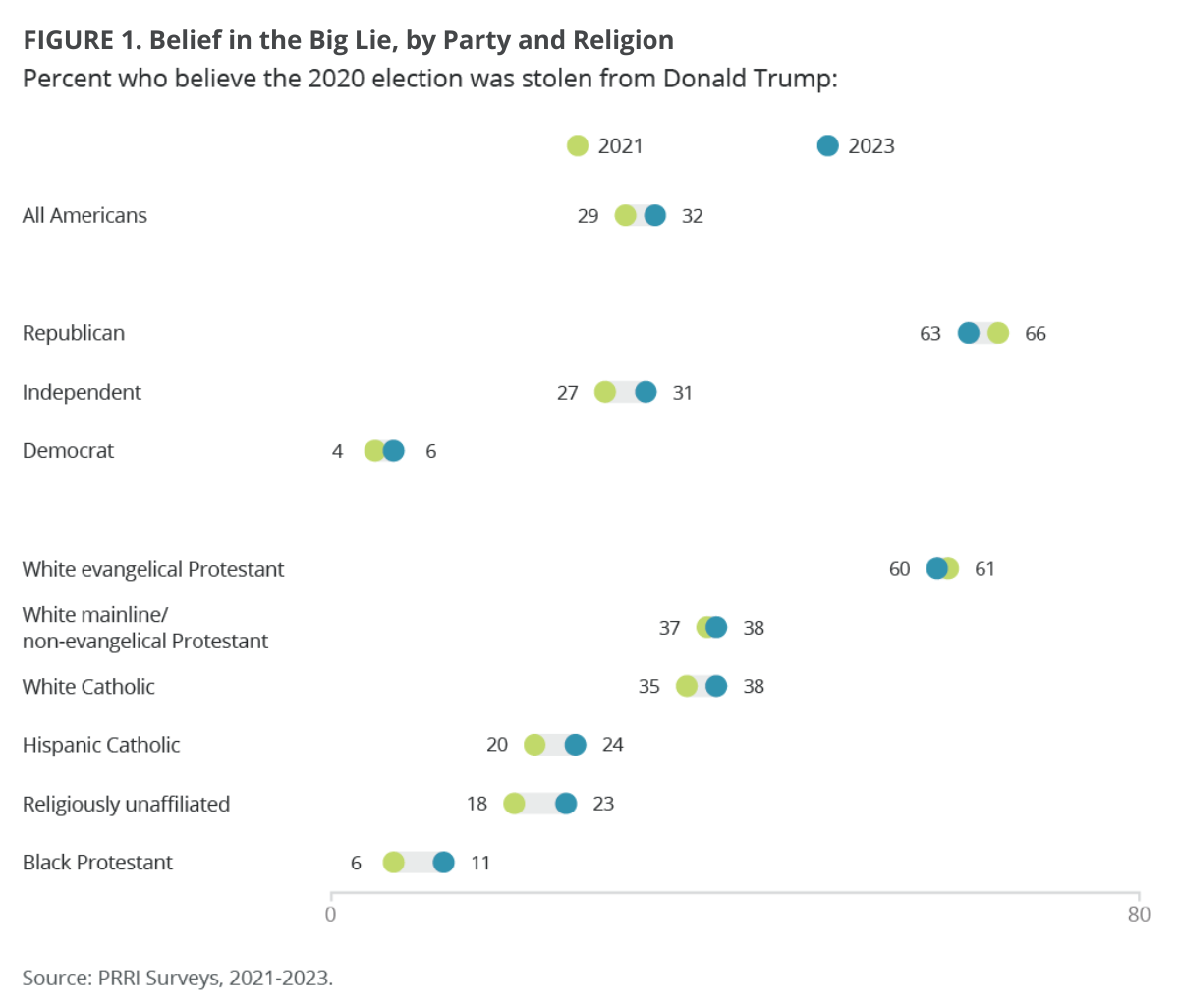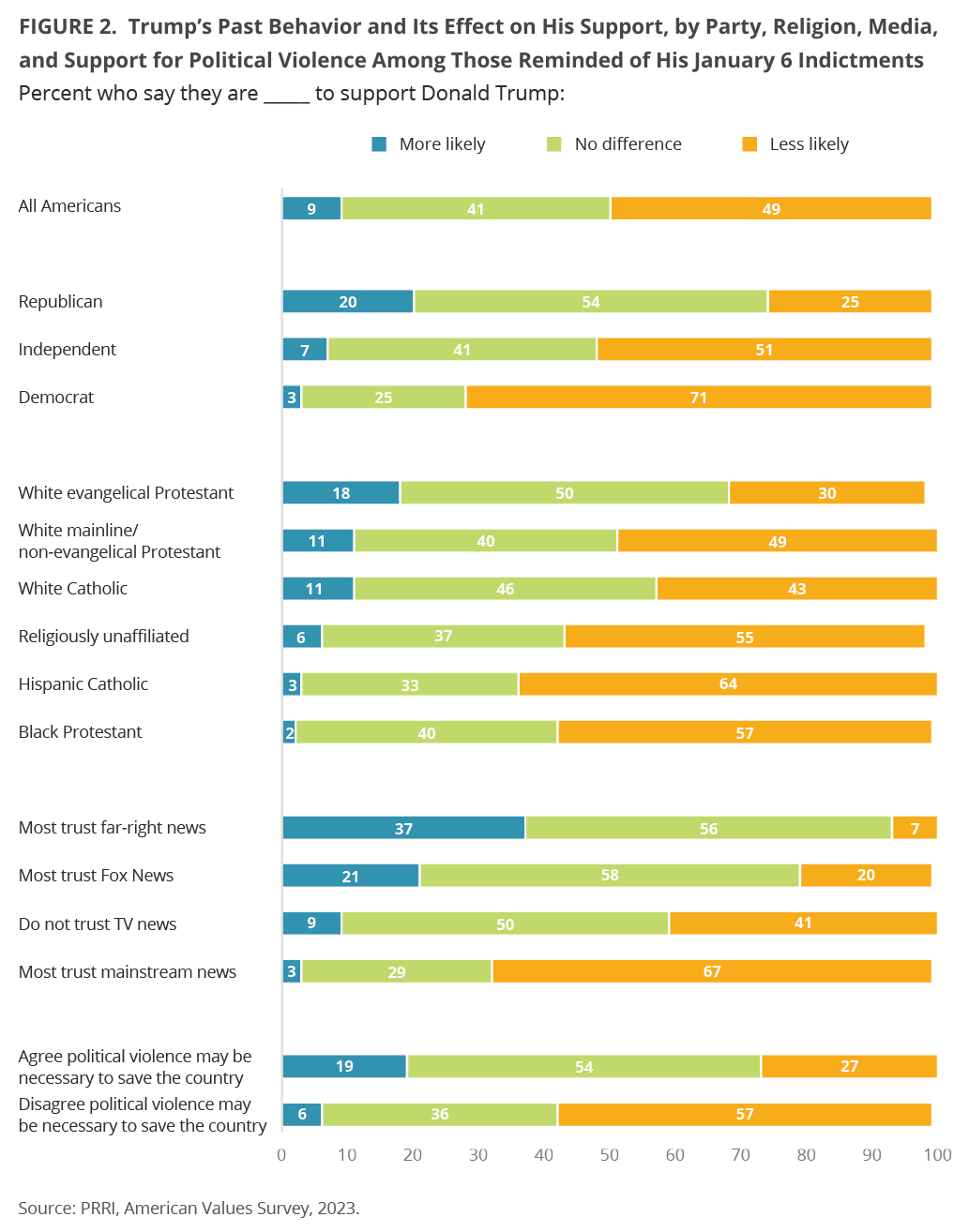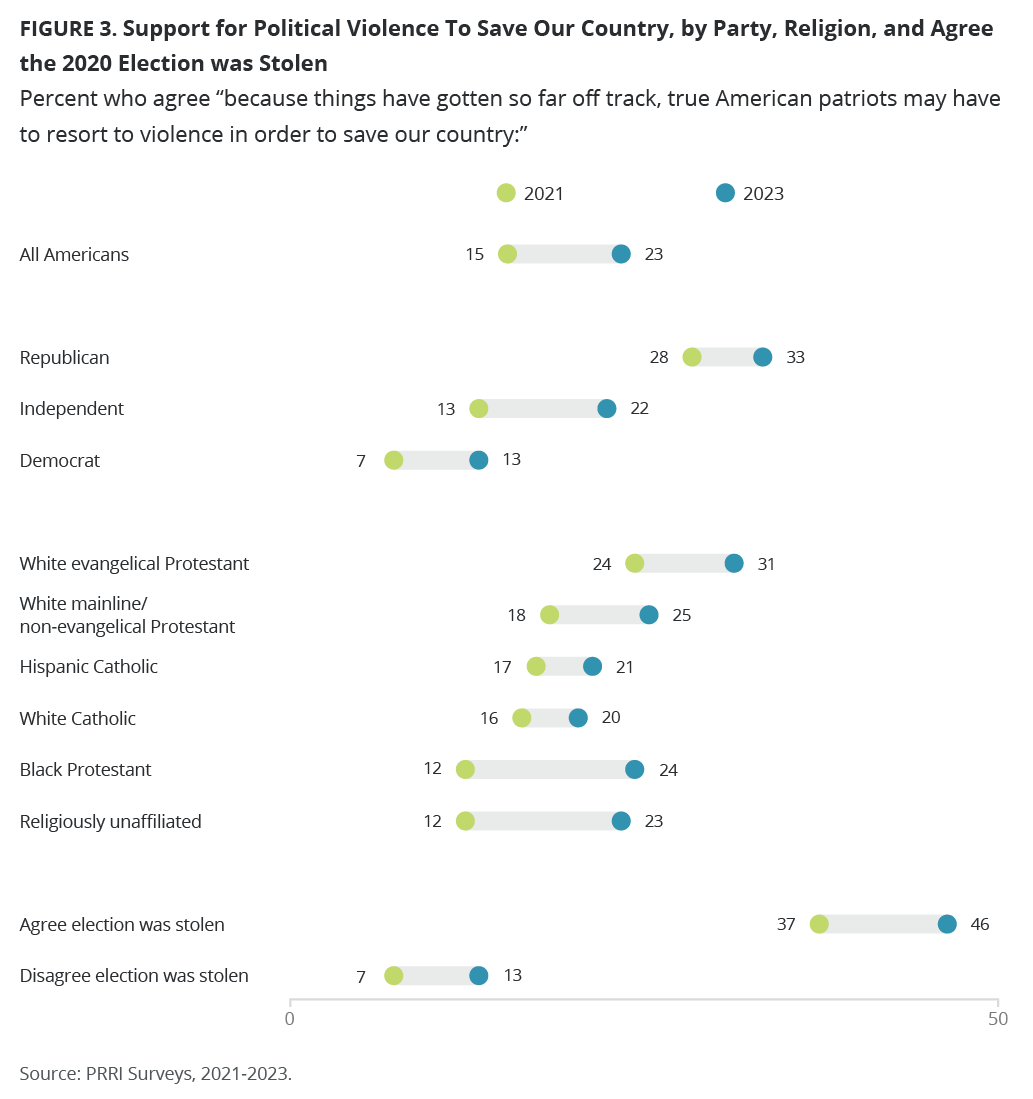January 6, 2024 marks the third anniversary of the unprecedented assault on our nation’s Capitol, in which Trump supporters attempted to overturn the results of the 2020 presidential election. Analysis of PRRI data shows that distinct partisan differences about the events leading up to January 6 remain, despite the convictions of many insurrectionists, and former president Donald Trump’s own criminal indictment for his role in the events.
Belief in the “Big Lie”
Just months after the January 6th insurrection, in March 2021, nearly three in ten Americans (29%) said the 2020 election was stolen from Donald Trump. PRRI’s recent American Values Survey showed a similar percentage of Americans believe the election was stolen (32%) as of September 2023. Partisan beliefs in the “Big Lie” have changed little from 2021 (when 66% of Republicans, 27% of independents, and 4% of Democrats believed the 2020 election was stolen) to 2023 (63% of Republicans, 31% of independents, and 6% of Democrats).
As of September 2023, six in ten white evangelical Protestants (60%) say the 2020 election was stolen from Donald Trump, compared with 38% of white mainline/non-evangelical Protestants and white Catholics, 24% of Hispanic Catholics, 23% of religiously unaffiliated Americans, and 11% of Black Protestants. These views have remained largely unchanged since 2021.
The vast majority of Americans who most trust far-right television news (92%) and two-thirds of those who most trust Fox News (65%) say the election was stolen. Around four in ten of those who do not trust TV news (38%) and 14% of those who most trust mainstream television news hold the same view.

Does Trump’s Past Behavior Affect His Support?
PRRI’s 2023 American Values Survey asked Americans whether Donald Trump’s past personal conduct made them more likely to support him, less likely to support him, or made no difference in their support for him. Half of our survey respondents were asked this question after being reminded that former President Donald Trump had “been indicted by a grand jury in four separate cases for alleged criminal activity related to the 2020 presidential election;” the other half was not given such a reminder. There were few discernible differences among Americans whether or not they were reminded of Trump’s federal indictments.
Around half of Americans who were reminded that Trump was indicted for his conduct on January 6 say his past personal conduct makes them less likely to support him (49%) and around four in ten Americans say it makes no difference in their support for him (41%). Less than one in ten Americans (9%) say they are more likely to support Trump because of his past personal conduct after being reminded of those indictments related to January 6. Slightly more than half of the Americans who were not reminded about his indictments said that his past personal conduct makes them less likely to support him (54%), while 37% said his conduct made no difference in their support for him. The remainder —just 6% — said his past personal conduct made them more likely to support him.
Figure 2 shows the results among Americans who were reminded about Trump’s federal indictments before being asked if Trump’s past personal conduct impacts their support for him in 2024. Two in ten Republicans (20%) are more likely to support Trump because of his past personal conduct, compared with only 7% of independents and 3% of Democrats.
Across all religious traditions, less than two in ten Americans say they are more likely to support Trump because of his past personal conduct (including 18% of white evangelical Protestants, 11% of white mainline/non-evangelical Protestants and white Catholics, 3% of Hispanic Catholics, and 2% of Black Protestants). Among religiously unaffiliated Americans, 6% say they are more likely to support Trump because of his past personal conduct. White evangelical Protestants are less likely than other groups to say their support for Trump will lessen because of his past personal conduct (30% vs. 64% of Hispanic Catholics, 57% of Black Protestants, 55% of religiously unaffiliated Americans, 49% of white mainline/non-evangelical Protestants, and 43% of white Catholics). Between one-third and half of religious Americans say their support for Trump is not affected by his behavior (33% of Hispanic Catholics, 40% of white mainline/non-evangelical Protestants and Black Protestants, 46% of white Catholics, and 50% of white evangelical Protestants), compared with 37% of religiously unaffiliated Americans.
Almost four in ten Americans who most trust far-right news say they are more likely to support Donald Trump because of his past personal conduct (37%), compared to 21% of Fox News viewers, 9% of those who do not trust TV news, and 3% of mainstream news viewers. Mainstream news viewers are the most likely to say they will support Trump less because of his behavior (67% vs. 41% who do not trust TV news, 20% of Fox News viewers, and 7% of far-right news viewers).
Americans who agree that political violence might be necessary to save the country are more likely to say their support for Trump is not affected by his past personal conduct (54% say this makes no difference, 27% say they are less likely to support him, and 19% say they are more likely to support him), while Americans who disagree that political violence might be necessary to save the country are more likely to say their support will lessen because of his past personal conduct (57% are less likely to support him, 36% say it makes no difference, and 6% are more likely to support him).

Who Believes Political Violence May Be Necessary to Save the Country?
In March 2021, 15% of Americans agreed that because things have gotten so far off track, true American patriots may have to resort to violence in order to save our country. In 2023, this percentage increased to nearly one in four Americans (23%). Among partisans, Republican support for political violence to save the country shifted slightly from 28% in 2021 to 33% in 2023, while support for political violence among independents increased from 13% to 22% and Democrats from 7% to 13%.
Support for political violence to save the country has gone up among religious Americans from 2021 to 2023 (24% to 31% among white evangelical Protestants, 18% to 25% among white mainline/non-evangelical Protestants, 17% to 21% among Hispanic Catholics, 16% to 20% among white Catholics, and 12% to 24% among Black Protestants). Among religiously unaffiliated Americans, support for political violence has increased since 2021 from 12% to 23%.
Around four in ten Americans who most trust far-right news (42%) and Fox News (39%) say they agree that political violence might be necessary, compared to 26% of those who do not trust TV news and 16% of mainstream news viewers.
Among Americans who believe the election was stolen from Donald Trump in 2020, agreement that political violence may be necessary to save the country has increased from 37% in 2021 to 46% in 2023. Support for the potential need for political violence among those who do not believe the election was stolen has doubled from 7% to 13%.
